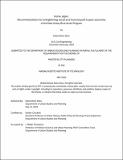Home, Again: Recommendations for strengthening social and financial post-buyout outcomes of the New Jersey Blue Acres Program
Author(s)
Zhao, Elisha Rose
DownloadThesis PDF (5.331Mb)
Advisor
Crockett, Karilyn
Terms of use
Metadata
Show full item recordAbstract
The buyout of homes that have undergone significant cumulative flood damage, or are poised to do so, is an increasingly relied upon tool used by government agencies, including the New Jersey Department of Environmental (NJDEP) Protection Blue Acres Program, to adapt within the arena of accelerating climate change. Buyouts act primarily as a form of climate adaptation; residents voluntarily move away from areas of high flood risk and are equipped generally with the market value of their former homes to find safer housing, while the former homes are demolished and made into open space. The post-buyout process, which is where social and financial consequences crystallize materially, forms the focus of this thesis study. In the case of Blue Acres, much effort is made to guide participants towards eligible incentives or supplemental relocation assistance on top of their appraisal value, which requires relocating outside of a flood zone and/or within the same community. Additionally, Blue Acres has established itself within a larger network of community organizations and other state agencies that it can point participants to for disaster recovery relief and housing counseling.
Nevertheless, its post-buyout process has potential to make concrete many of the improvements that buyout scholars across the U.S. advise, further strengthening its role as a national pioneer in managed retreat. I propose five recommendations based on this literature: establishing a tracking system of outcomes, creating a low-income homeowners relocation incentive, expanding on the Smart Move pilot program, involving former and remaining residents to decide how bought-out land in their neighborhood is used, and collaborating with municipalities to bring buyouts into their long-range adaptation planning. These form the basis of my question: How can Blue Acres strengthen the post-buyout branch of its services to ensure better long-term social and financial outcomes for its participating homeowners?
Keywords: Flood, buyouts, climate adaptation, climate resilience, municipal finance, local government, housing, land use, community engagement
Date issued
2024-05Department
Massachusetts Institute of Technology. Department of Urban Studies and PlanningPublisher
Massachusetts Institute of Technology